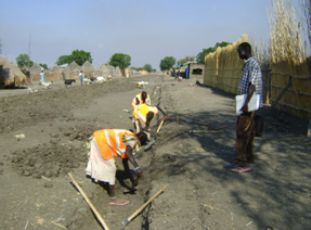Labor-based road maintenance benefits mothers and children in Malakal
By Richard Ruati
September 26, 2010 (MALAKAL) — A nine-month-old road improvement project, funded by the United States Agency for International Development (USAID) through its Sudan Infrastructure Services Project (SISP), is the first community-based project of its kind in Malakal, Upper Nile State. It aims to improve poor drainage systems on the urban road network and improve the local economy by hiring local men and women.

Previously, the condition of rural roads in Malakal was dismal. During the rainy season, roads disappeared and were unusable.
Community roads are essential to the socio-economic development of vulnerable populations. Road improvement increases agricultural production, facilitates access to educational and health facilities and provides interaction among rural communities.
Women labourers, who have acquired road construction training, are greatly contributing to the project by using labour-based activities. Currently the project employs about 52 women.
One local female resident, Nyandeng Ding, stated that “before this project, I used to go nine kilometres away to fetch firewood and sell it to earn money. My close friend whispered to me about this project. Since I joined, I have forgotten about my murky days of fetching firewood and my life has changed dramatically – for an uneducated mother like me, I cannot think of any other employment opportunities in Malakal.”
Mary Chan, a member of the Malakal Women Association said, “I have a great interest in enhanced program opportunities for Malakal women. But the strength of this program is that it offers women more than just road maintenance, but also it sustains their kitchens.”
The daughters of these women also join their mothers at the peak of manual work.
On alternate days, the women traditionally meet in their local communities to attend sessions run by the Malakal Women Association. Women finish projects and hope to start new ones, take field trips, and cultivate friendships.
Nyaboki Omot, aged 40, said that earnings from the work she did enabled her to put food on table for her hungry family and part of the cash solved a chronic health problem, which she has endured with for more than a decade.
Women in Malakal have are demonstrating a hard-working spirit which it is hoped, will inspire and empower fellow vulnerable women in remote regions to use the money earned from their work on this project to lift themselves out of poverty.
One over fifty, motherless woman recounted that, “no single vendor in [my] neighbourhood could trust to give [me] a loan because they knew I have been jobless, but my enrolment in this project made my closest vendors give me [a] loan of goods and services for one month.”
Mobil Majok, after earning enough money from the project, changed the life of her 15-year-old son, by sending him to school. “Had it not been for this project,” she said, “[I] could have not kept up with the rising school fees in Malakal.”
In urban centres of Malakal, people depend on the mainly Arab merchants who supply food stuffs from Khartoum, sold in Malakal at expensive prices. Low income residents can struggle to buy such food commodities, as many people live below US$1 per a day.
Sunday John uses money she accumulated while working for the labour-based project to feed her two children. She said that before the introduction of the project, life was difficult for her and her two kids as she could not afford to buy Dura (Sorghum), a staple food among the Shilluk people, the main inhabitants of Malakal.
Nyama Jok, who spent one year working on the Malakal drainage project, hopes that the work will continue because she understands how beneficial this project has been to many women in her community. Jok told the program that, “My savings from this project helped [me] to build two tukuls (mud houses). Before, I was sleeping in a make-shift tent.”
While working for the project, Jok became pregnant with her first baby girl after having four boys.
“I thank the initiators of the project. It is because of my hard work, God looked into my plight and decided to reward me with a baby girl who will help me in the future to cook for me when I get old, as my boys would not cook for me during my time of work. Instead they would wait for me to return, tired and I would cook for them,” Jok said in an jubilant mood, adding that, “I have benefited more than anybody.”
State Director of Roads and Bridges in Upper Nile State, Jeremiah, is a strong supporter of the employment of labourers on the drainage project in Malakal. He said he believed women to be “the real architects of society.”
(ST)
